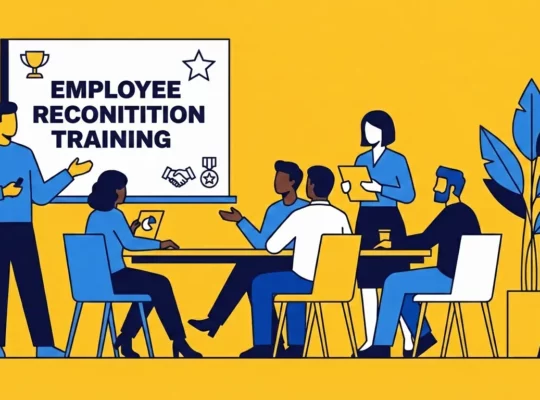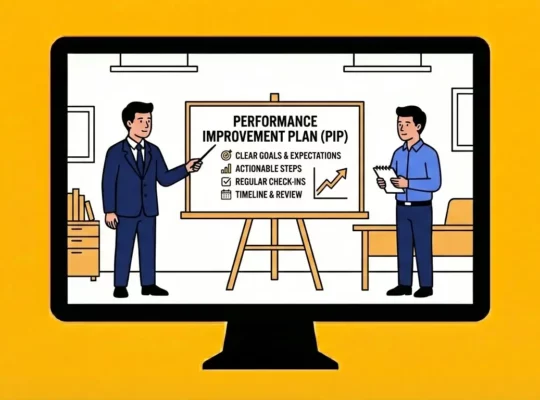After a year of work, the annual maintenance is necessary within a company. This is the time to evaluate the achievement of objectives and to identify the limitations and problems encountered. Thus, effective solutions can be found to approach the new year more serenely. During an annual interview, the questions to ask are sometimes difficult to find for the employer, but also for the employee during these preparations. Whether you are an employer or an employee, this post is for you. You will discover the questions that are asked during an annual interview.
Table of Contents
- Types of questions to ask during an annual interview
- 6 Questions Every Employer Must Note for the Next Annual Interview
Types of questions to ask during an annual interview
As you will have understood, the annual interview is based on different questions asked by the employer or the HR team. The questionnaire can be administered during a face-to-face interview or emailed to the employee. In case it is sent by email, you can use a trusted platform for employee reviews, which is useful for collecting reviews.
Each company is free to organize its questionnaire differently and ask different questions. However, there are 4 types of questions to ask during an annual interview.
A. Productivity issues
The first type of question is used to evaluate the activity of the company over the past year. Indeed, at the beginning of the year, objectives are set in particular in terms of productivity. These questions therefore make it possible to assess the achievement of these objectives. They also seek to identify the obstacles preventing their effective attainment.
B. Issues related to needs
Depending on the company and the position held, tools must be made available to workers to achieve the objectives set. But, it may happen that the necessary tools are not available or that the available tools are inadequate. The questions related to needs are aimed at understanding everything that is lacking to increase the productivity of the company. Thus, concrete decisions can be made concerning the realities of the company.
C. Issues of well-being at work
The work environment impacts workers’ productivity. Thus, a fulfilled employee at work is more likely to deliver good results. Questions about well-being at work help assess the work environment in general. It is a question of learning about the relationship between colleagues and that with superiors. It is also about learning more about what could improve the quality of life at work (QWL).
The healthier the work environment, the more positive your employer brand. You can further develop your employer brand through communication. Moreover, these two concepts are complementary. Here’s something to learn about internal communication in companies and employer branding: a winning duo.
D. Career advancement issues
Any ambitious worker hopes to move up in rank within the company where they work, especially if they feel good there. This is why they express their full potential and become indispensable. To maintain this enthusiasm at work, it is essential to motivate employees. This includes opportunities for career advancement. The last type of question to ask during an annual interview is therefore career development. It allows employers to know the professional expectations of their employees. It also helps assess employee job satisfaction.
Questions related to career advancement are also asked in satisfaction questionnaires. You can click here to learn more about the importance of employee satisfaction surveys in companies.
6 Questions Every Employer Must Note for the Next Annual Interview
1. What were the goals of the past year?
During the annual interview, the first question to ask is about the objectives of the past year. It can, however, be divided into several questions. Here, it is not only a matter of answering the question previously stated. It is also necessary to inquire about the achievement of these objectives. Thus, employers get an idea about the success rate and the failure rate. From that point on, it is necessary to inquire about the reasons why certain objectives have not been achieved. Hence the importance of the following question, which concerns the difficulties encountered.
2. What were the difficulties encountered?
It may happen that not all the objectives set are achieved. This is often due to several obstacles or disabling situations. During the individual interview, this question is therefore useful to get an idea about the difficulties encountered while thinking about efficient solutions. Moreover, it allows the employee to realize that employers care about their productivity. They are therefore more likely to talk openly about the obstacles to achieving their annual goals of improving HR communication.
The annual interview therefore represents a lever in the resolution of the challenges of good HR communication.
3. What should be improved?
Employers are sponsors and employees are executors. They are therefore more likely to know the problems present in the company. Being the most affected by situations, they are also in the best position to suggest improvements. Among the questions to ask during an annual interview, the question of suggestions for improvement is a necessity. It makes it possible to evaluate the effectiveness of all the means implemented to facilitate the work. But that’s not all. This question also gives concrete ways to improve the company.
Indeed, the means made available to employees to obtain the best results do not necessarily meet their needs. That is why it is better to take the opinion of the workers. Once this is done, the suggestions can be analyzed and the most relevant ones are implemented. Thus, employers can be almost certain that the changes will bear fruit.
4. What are your career goals for the coming year?
During the annual interview, the questions to be asked will necessarily have to address the aspect of professional objectives. Indeed, this interview aims to evaluate the company in general in order to get good marks for the coming year. Asking this question allows the HR team to check the adequacy between the worker’s objectives and those of the company. However, this question during the annual interview also aims to see if the employee is motivated and involved.
It should be remembered that the objectives defined must be SMART, i.e.:
- specific: this means that objectives must be clearly stated and serve a specific purpose;
- measurable: that is to say, their achievement must be evaluable;
- achievable: they must be achievable;
- realistic: which means that they must correspond to the realities of the company;
- Temporal: these objectives must be achieved after a given period, here it is twelve months.
With this question, employers will be able to implement ways to help employees achieve their goals.
5. What do you think of your work environment?
In general, the best results are obtained when the worker is comfortable in the work environment. One of the purposes of the annual maintenance is to assess the company’s productivity and opportunities for improvement. Quality of life at work (QWL) is therefore an issue to be raised during the annual interview. But, you don’t have to wait for the annual interview to assess the QWL. You can do this through a questionnaire administered punctually. Here are some advantages of a QWL questionnaire.
The issue of the work environment is very broad. It includes:
- the general atmosphere at work;
- relationships with colleagues;
- relations with superiors;
- the feeling of belonging to the company.
Through this assessment, employers learn about the nature of the relationships between employees. This aspect is very important because the success of a company depends on the synergy of action between employees. If because of conflictual relationships, communication is broken, the company is damaged. Through the question about QWL, employers also want to know if the worker feels integrated into the company. If not, the work experience is less enjoyable.
6. What are your prospects for career advancement in the short, medium, and long term?
With this question, employers have an idea about the worker’s aspirations. They can also assess employee job satisfaction. This question therefore has as much its place in an annual interview as in the questions to be asked in a satisfaction questionnaire.
The short-term answer makes it possible to know if the worker still sees themselves in this company. If this is not the case, it is time to dig a little deeper to find out what motivates their departure. It may be a more attractive offer proposed by a competitor or not. This choice may also be motivated by the feeling of stagnation. Medium- and long-term responses allow employers to assess workers’ ambition. Thus, the employer identifies opportunities for advancement that may be of interest to the employee.
The annual review is a crucial opportunity to evaluate progress, address challenges, and set a productive path forward. Both employers and employees benefit from strategic questions that focus on productivity, necessary resources, workplace well-being, and career development. By asking about past achievements, encountered obstacles, suggestions for improvement, and future career goals, companies create a transparent dialogue that fosters motivation and clarity. This guide explores the key types of questions to include for a successful, growth-focused annual review process.





